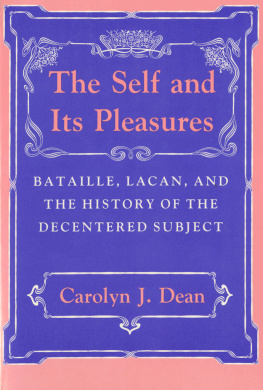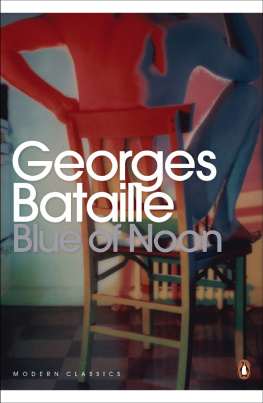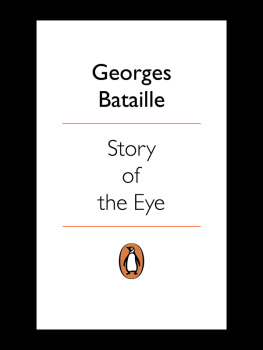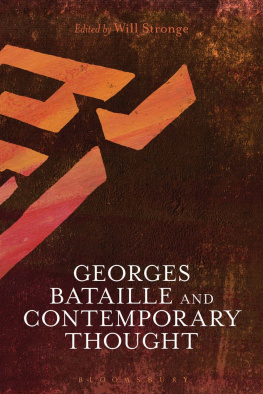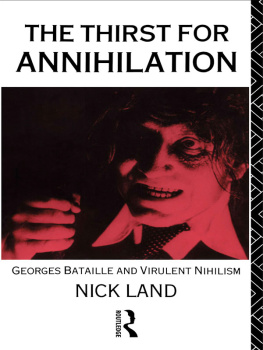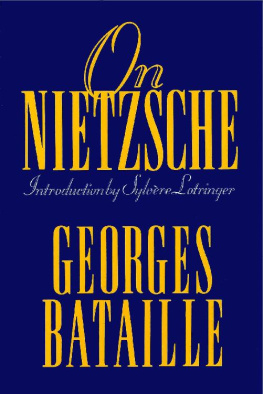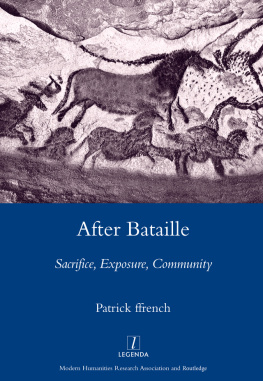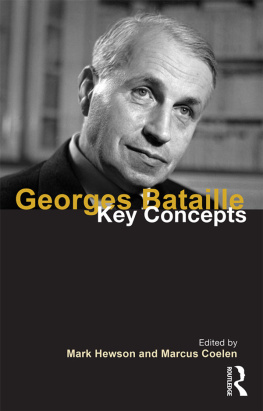Acknowledgments
I thank the University of California at Berkeley and the Andrew W. Mellon Foundation for providing the funds and leave time necessary to undertake the writing and research of this book.
I am especially grateful to Mary Gluck, David Joravsky, and Sarah Maza, who graciously read various portions of the manuscript. I am also indebted to Mark Posters criticism and to Michael Roth, whose close reading of the final draft helped me clarify and sharpen my argument.
I owe my most profound intellectual debts to Denis Hollier, Lynn Hunt, and Martin Jay, without whose encouragement, criticism, and commitment this book might never have taken the direction it did. Martin Jay guided and commented on this work at every stage of its unfolding, and it is to him that I owe the deepest gratitude.
John Ackerman, Judith Bailey, and the editorial staff at Cornell University Press helped prepare the final manuscript and offered invaluable assistance. Gretchen Schultz and Brigitte Mahuzier advised me on translations and helped me relax. For everything else, I thank my colleagues and friends Elizabeth Barnes, Laird Boswell, Julie Greenberg, Laura Hein, Walter Hixson, James Beale, Michael Sherry, Jennifer Terry, and Sharon Ullman. And a special thank you to Michael Polignano, Laurie Bernstein, Robert Weinberg, and Nicole Albert.
One portion of this book has appeared in different form in Representations 13 (Winter 1986).
C. J. D.
Chapter One
The Legal Status
of the Irrational
After about 1860, the criminal body came to be taken as evidence of deviance, and the function of law was to survey and repress criminals who presented a social danger. Scientists measured and minutely detailed the deviants physique, trying to localize deviance in physical anomalies. The criminal body and criminal behavior were conceived as transparent expressions of a deviant soul, so that the causes and symptoms of deviance were conflated in a physical mark that by its very presence testified to the perversity of the moral will and explained deviance simply by making it visible. Dr. Emile Laurent described the criminal as a being apart, as a vulgar type, a cool temperament, average height, a low and short forehead with a deep scar on the upper part, deep-set eyes, large and thick nostrils, the head high and narrow at the top. They labeled these so-called organisms degeneratesto use a term first employed in France by B. A. Morel in his Trait des dgnrescences (1857). Legislators exploited psychiatric language to justify harsh penalties, including capital punishment and the Relegation Act of 1885, which sent recidivists to New Caledonia for life.
And in spite of the denunciations of so-called degenerate populations and the harshness of the penal measures, French courts judged criminal responsibility according to a classical conception of free will. Though psychiatrists relationship to the legal system was becoming increasingly complicated, their main task was to decide whether the delinquent was sane or insane, that is, whether the criminal could be held legally responsible for the crime.
In this context, psychiatrists began to promote a distinction between the incurable recidivist and curable criminals.
Psychiatrists delineated intermediate states between sanity and insanity to permit a more refined interpretation of criminal responsibility and thus allow for a more humane, because more scientific and studied, treatment of criminals. They thus reasoned that if responsibility were to be determined by doctors as well as by lawyers, no one who could be judged by the trained medical eye as irresponsible would be wrongfully interned, and by the same token, no responsible criminal would escape justice. As Jan Goldstein maintains, psychiatrists had their own professional interests at heart rather than those of the criminal. They sought to make these intermediate zones the province of medical expertise, to assert that insanity and the intermediary nervous pathologies shared an essential nature, making it only logical that the latter be entrusted to the already proven experts on insanityhence the importance of the new labeldemi-folie.
The most zealous proponents of medical intervention were the members of the Ligue Nationale Franaise dHygiene Mentale, founded in 1920 by the eminent psychiatrists Edouard Toulouse and G. Genil-Perrin. One of its intellectual ancestors was the social hygiene movement, which was organized as earlyas 1902 to combat alcoholism, tuberculosis, and syphilis. It represented the exten
Following a model of social hygiene, the league sought to regulate deviants through a general reform of social institutions according to scientific criteriaby adapting institutions to the biological and neurological needs of human beings. It called on citizens to abstain from alcohol and from sex outside of marriage, but such appeals had never been taken as seriously in France as in Anglo-Saxon countries. As one advocate noted, his hygiene manual was an effort to adapt prophylaxis, including celibacy and temperance, to French culture, to a Latin and, hence, according to him, a more or less hostile public. But after the Great War the league became increasingly popular, and it even had some influence on public health policy.
The league, taking its inspiration from Belgian and American models, That same year, he and another activist in the league, Roger Dupouy, founded the Institut de Prophylaxie Mentale located at Sainte Annes Hospital in Paris. Converted into the Hpital Henri Rouselle in 1926, it included a research laboratory, an outpatient clinic, and teaching rooms.
Many psychiatrists associated with the league thus insisted on the importance of replacing legal analyses with medical ones in order to ensure the success of rehabilitation, fOI the first step in a successful rehabilitation program was determining who could and who could not be cured. Along these lines, the criminologist Paul Schiff argued that the only means to reclaim criminals and psychopaths was through a reeducative segregation based on a medical and psychiatric foundation instead of a punitive segregation based on a juridical one. As Frdric-Jean Desthieux remarked, the league was undertaking no less than a vast sanitary and social reorganization necessary to the regeneration of the social body when it insisted on the substitution of medical for legal intervention in social life:
Since the individual has not been appropriately educated, rare are those sick people who will turn themselves over to psychiatric care. How can they even know they are ill? Will their entourage even allow them to seek help? Psychiatrists can predict all accidents (Dr. Dupouy affirms it). When they are not predicted, it is because of a defect in social organization. Society accepts that 65 thousand of its curable citizens be interned each yearforever. Society does not demand that the doctor be the assistant of the sick and the defender of society.
Paul Schiff perhaps put it most bluntly when he argued that psychiatrists could not continue to claim that a criminal was both abnormal and responsible for his or her crime when legal logic had always equated abnormality with nonculpability; instead, he insisted, legal concepts had to be reformed in accord with psychi
This insisten ce on replacing legal with medical diagnoses clearly manifests expanding psychiatric power. More important, it provides one window on how that power was expanded and why it took the theoretical forms it did. Of course, psychiatric expansion was linked to the relationship between psychiatry and the state. As William Schneider has argued, by the 1920s, social hygiene was indistinguishable fram public health, and doctors became agents in the states effort to use science to regenerate a presumably declining and defective population. Moreover, the National League for Mental Hygiene was closely linked to the French Eugenics Society and had braad connections to influential legislators concerned with health questions. But in order to address how the medicalization of punishment shaped the reception of psychoanalysis, I want to focus instead on the efforts of psychiatrists to distinguish normal from abnormal criminals, curable fram incurable ones, to define the intermediate classificatory space between normality and pathology and identify those who represented a social danger.

